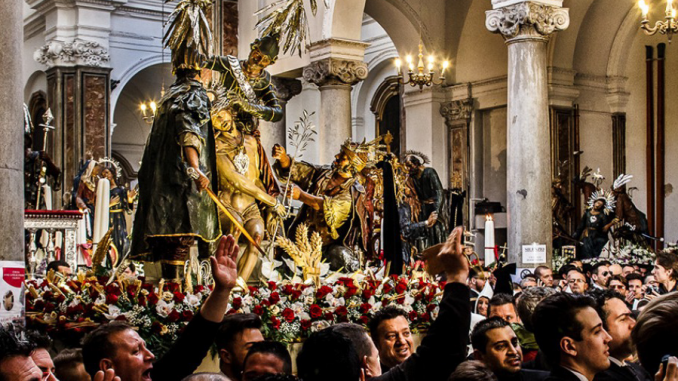
If you’re lucky enough to be in Italy for Easter, you won’t see the famous bunny or go for an Easter egg hunt. But Easter in Italy is a huge holiday, second only to Christmas in its importance for Italians. While the days leading up to Easter include solemn processions and masses, Pasqua is a joyous celebration marked with rituals and traditions. La Pasquetta, the Monday after Easter Sunday, is also a public holiday throughout the country.
On Good Friday, the pope celebrates the Via Crucis, or Stations of the Cross, in Rome near the Colosseum. A huge cross with burning torches lights the sky as the stations of the cross are described in several languages, and the pope gives a blessing at the end. Easter mass is held in every church in Italy, with the biggest and most popular celebrated by the pope at Saint Peter’s Basilica. The Prefecture of the Papal Household recommends ordering free tickets at least 2–6 months in advance.
Solemn religious processions are held in Italian cities and towns on the Friday or Saturday before Easter and sometimes on the Sunday holiday. Many churches have special statues of the Virgin Mary and Jesus that may be paraded through the city or displayed in the main square (piazza).
Participants are often dressed in traditional ancient costumes, and olive branches are frequently used along with palm fronds in the processions and to decorate churches.
Sicily has elaborate and dramatic processions. Enna holds a large event on Good Friday, with about 2,000 friars dressed in ancient costumes walking through the streets of the city. Trapani is another interesting place to see processions, held for several days during Holy Week. The Good Friday procession there, Misteri di Trapani, lasts 24 hours.
Since Easter is the end of the Lenten season – which requires sacrifice and reserve – food plays a big part in the celebrations.
Traditional holiday foods across Italy may include lamb or goat, artichokes, and special Easter breads that vary from region to region. Pannetone sweet bread and Colomba (dove-shaped) bread are often given as gifts, as are hollow chocolate eggs that usually come with a surprise inside.
On Easter Monday, some cities hold dances, free concerts, or unusual games, often involving eggs. In the Umbrian hill town of Panicale, cheese is the star. Ruzzolone is played by rolling huge wheels of cheese, weighing about 4 kilos, around the village walls. The object is to get your cheese around the course using the fewest number of strokes. Following the cheese contest, there is a band in the piazza – and wine, of course. (Martha Bakerjian)




Be the first to comment